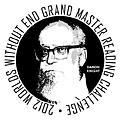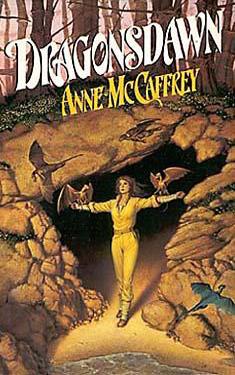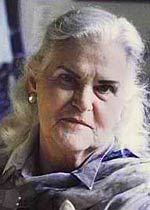GMRC Review: Dragonsdawn by Anne McCaffrey
 Guest Blogger and WWEnd member, valashain, reviews science fiction and fantasy books on his blog Val’s Random Comments which we featured in a previous post: Five SF/F Book Blogs Worth Reading. Val has posted many great reviews to WWEnd and this is his ninth for the GMRC. Be sure to visit his site and let him know you found him here.
Guest Blogger and WWEnd member, valashain, reviews science fiction and fantasy books on his blog Val’s Random Comments which we featured in a previous post: Five SF/F Book Blogs Worth Reading. Val has posted many great reviews to WWEnd and this is his ninth for the GMRC. Be sure to visit his site and let him know you found him here.
 As I’ve noted before, the Damon Knight memorial Grand Master Award is seriously short on female authors. Only four out of the twenty-eight winners are women. Since one of my objectives for this year is to read more work written by women I am going to try to read all four for this challenge. I read Forerunner by Andre Norton and The Wind’s Twelve Quarters by Ursula K. Le Guin earlier this year. Next up is Anne McCaffrey, who was honoured with this award in 2005. Picking a book was a bit of a problem. McCaffrey is best known for her Pern novels, of which I have read exactly one: Dragonflight, published in 1968. I didn’t like it very much. I’m sure it was sensational at the time but forty years on, it seemed like a pretty mediocre novel to me. An Australian friend of mine is a bit better acquainted with McCaffrey’s oeuvre and she suggested I try Dragonsdawn (1988). Chronologically it is the first of the Pern novels (there are a few shorter pieces in the same era or even set before the novel) but McCaffrey wrote it some twenty years after Dragonflight. I must say, the fact that she had a bunch of novels under her belt by this time shows in the writing.
As I’ve noted before, the Damon Knight memorial Grand Master Award is seriously short on female authors. Only four out of the twenty-eight winners are women. Since one of my objectives for this year is to read more work written by women I am going to try to read all four for this challenge. I read Forerunner by Andre Norton and The Wind’s Twelve Quarters by Ursula K. Le Guin earlier this year. Next up is Anne McCaffrey, who was honoured with this award in 2005. Picking a book was a bit of a problem. McCaffrey is best known for her Pern novels, of which I have read exactly one: Dragonflight, published in 1968. I didn’t like it very much. I’m sure it was sensational at the time but forty years on, it seemed like a pretty mediocre novel to me. An Australian friend of mine is a bit better acquainted with McCaffrey’s oeuvre and she suggested I try Dragonsdawn (1988). Chronologically it is the first of the Pern novels (there are a few shorter pieces in the same era or even set before the novel) but McCaffrey wrote it some twenty years after Dragonflight. I must say, the fact that she had a bunch of novels under her belt by this time shows in the writing.
After a long journey though interstellar space, three ships full of colonists arrive in the Rukbat system where they intend to colonize the third planet. When they bought into the expedition, they knew it would be a one way trip. The ships are nearly out of fuel, they will be cannibalized to provide the colony with materials. Pern, as the third planet is referred to, is a remote place, far away from the busy shipping lanes of the galaxy and has only been surveyed briefly. The planet has developed its own ecology but is without sentient life. There is every possibility to create an utopian society, away from the wars and conflicts of the more densely populated regions of space. The colony is developing rapidly with only minor squabbles along the way when the colonists become aware of a major threat to their existence. Threadfall. Their rapidly declining technological resources will not be enough to save them. Other, more radical options will have to be considered.
McCaffrey made Pern and the colony the central characters really. She uses the third person point of view throughout the novel and she uses a lot of different characters to tell the tale. None of them are central to the narrative. She uses them to show a particular development in the colony, although some characters seem only marginally important to the story. I suppose you could see Sorka and Sean as central as they represent the future of Pern but they don’t really get enough screen time to be called the main characters. All this jumping around makes it hard to get really emotionally invested in any of the characters. It really is a chronicle of the first years of human settlement on Pern and should be read as such. Some readers might prefer a more character oriented narrative.
Pern has always been a curious mix of science fictional and fantastic elements. It has been clear form the start that humans are not native to the planet, but society on Pern is mostly low tech and the presence of dragons makes it lean towards fantasy. This novel is primarily science fiction, perhaps even space opera. McCaffrey describes the arrival of the fleet and disembarkation in detail. The logistics of putting thousands of people as well as supplies to establish a colony on the surface are complicated and contain the origins of one of the conflicts that will arise in the new colony. I thought this section slowed the beginning of the book down a bit more than necessary. On the other hand, there is something compelling about beginnings. We are seeing the birth of a world in this novel, the planet is a blank canvas for the colonists to work with.
Throughout the novel we watch the colonists struggle with declining supplies and problems keeping their technological base at an adequate level. The planet has plenty of natural resources but turning these into high tech machinery or even fuel for the remaining shuttles is not an easy matter. It also doesn’t appear to be the goal. The colonists long for a simpler rural style of living and the large stretches of unoccupied land provide ample opportunity. From a highly organized group lead among military lines, they quickly evolve into pioneers used to fending for themselves and taking care of their own business. The novel shows us an interesting reversal when the colony is threatened. One that obviously doesn’t go without a lot of friction.
 Interesting enough, McCaffrey addresses one of my pet peeves when it comes to books including dragons: their ecology. Putting aside quibbles over how to get something as large as a dragon into the air, there is a limit to how large a predator a given ecosystem can support, and dragons, especially in large numbers seem to defy that limit. It is a problem more fantasy novels struggle with, not only with dragons. You frequently encounter regions with an unlikely number of very dangerous large predators. It shouldn’t come as a surprise then that dragons are a species created by a very clever geneticist with a specific purpose in mind. Apart from dragons, the colonists are introducing new species on the planet at a tremendous pace. I don’t think any ecologist would even dare to predict what such a injection of invasive species would do to native life but McCaffrey at least makes an attempt to make it sound plausible. Interesting enough the settlers aren’t particularly careful in dealing with the ecosystem, sustainable hunting practices for instance, have yet to be developed. McCaffrey gave it a try, clearly thought about the origins of her world, but our understanding of ecosystems would have to improve an awful lot before such confidence in changing a world so dramatically would be justified. I can think of novels that handle ecological themes more successfully.
Interesting enough, McCaffrey addresses one of my pet peeves when it comes to books including dragons: their ecology. Putting aside quibbles over how to get something as large as a dragon into the air, there is a limit to how large a predator a given ecosystem can support, and dragons, especially in large numbers seem to defy that limit. It is a problem more fantasy novels struggle with, not only with dragons. You frequently encounter regions with an unlikely number of very dangerous large predators. It shouldn’t come as a surprise then that dragons are a species created by a very clever geneticist with a specific purpose in mind. Apart from dragons, the colonists are introducing new species on the planet at a tremendous pace. I don’t think any ecologist would even dare to predict what such a injection of invasive species would do to native life but McCaffrey at least makes an attempt to make it sound plausible. Interesting enough the settlers aren’t particularly careful in dealing with the ecosystem, sustainable hunting practices for instance, have yet to be developed. McCaffrey gave it a try, clearly thought about the origins of her world, but our understanding of ecosystems would have to improve an awful lot before such confidence in changing a world so dramatically would be justified. I can think of novels that handle ecological themes more successfully.
Dragonsdawn is a prequel of sorts and I guess to an extent is suffers from the problems many of these books almost inevitably run in to. The outcome is known, the solution to the threat the colony faces is obvious, the colonists’ loss of their technological base a certainty. I guess that problem is what really tips the scale for me. Compared to Dragonsflight, McCaffrey’s writing has matured a lot but with a more or less predictable story and the book’s tendency to jump from one character to the next in rapid succession, it is not really a satisfactory read. None of the characters really develop enough depth to draw me into their story or make me feel more than a touch concerned for their well being. I do get the feeling that if you have read more of the Pern novels than I have, some of the names and events mentioned will have more meaning than they did for me. Dragonsdawn can be read on its own just fine but in the end I think it much more enjoyable for the real fan of the series.



















 Full Details
Full Details


4 Comments
If characters drive you, and you’re willing to give Anne another shot, I highly recommend the Dragon Drums trilogy. It’s set at Harper Hall and some of the most compelling characters in the series can be found there. MasterHarper Robinton is one of my favorite literary characters. There is also the book “The MasterHarper of Pern,” but I’d recommend the Dragon Drums trilogy first.
If anybody asks me, that’s the part of Pern I recommend first. “Dragonsdawn” is good, but not one of the best in the series in my opinion. There were some definite flaws, though I did enjoy learning the history of the world as well as where dragons came from, but there were also some places where the story could have been improved.
If you’re looking for some other stellar women in SF/F, I have three strong recommendations: Julian May (her Many-Colored Land series), Sharon Shinn (her Angel series) and top of my list these days, Lois McMaster Bujold. Bujold does an excellent job with both fantasy (Curse of Chalion/Sharing Knife) and science fiction (the Vorkosigan series). All three women do an excellent job with characters and world building.
I am a longtime fan of Anne McCafferey and have not only enjoyed many of her books, but have re-read some of them multiple times and still enjoyed the re-readings. I think they just hit me the right way when I first read them, and they’ve held up for me.
Great recommendations, Karen! I really liked the Pliocene Exile series. Speaking of stellar women in SF/F, have you seen our list of Award Winning Women Authors? (https://www.worldswithoutend.com/lists_women_winners.asp) Some great books on that list.
@Brekke: I wonder if I should try some of McCaffrey’s non-Pern books first.
@Karen: The Many-Coloured Land is on the to read list. As soon as I can find a copy of it that is. I also expect to read Nancy Kress and Elizabeth Bear soon. No shortage on good SF and F by women but they are seriously under-represented in this particular award.
@Dave: I regularly check that list for inspiration 😉
Sorry, the comment form is closed at this time.